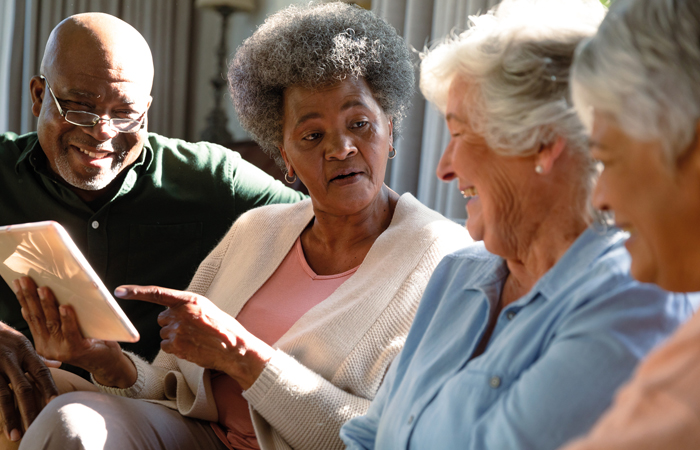In OTC
Follow this topic
Bookmark
Record learning outcomes
At the end of 2018, for the first time in history, the number of over-65s in the world surpassed the number of under-fives, according to the United Nations. And a census which took place in March 2021 found that nearly one in five people in England and Wales are now aged over 65.
Our ageing population means that older people will be one of the largest demographics regularly visiting the pharmacy to pick up prescriptions and OTC remedies. Pharmacy teams are therefore in the perfect position to help them maintain their health for as long as possible, especially when it comes to preventative measures.
Keeping moving
Exercise is a key part of living a healthy lifestyle. It is known to reduce an individual’s risk of major illnesses such as coronary heart disease, stroke, type 2 diabetes and cancer. There is also significant evidence that keeping fit can boost self-esteem, mood, sleep quality and energy, as well as reducing risk of stress and depression.
The NHS recommends that adults aged 65 and over should:
- Aim to be physically active every day, even if it’s just light activity
- Do activities that improve strength, balance and flexibility on at least two days a week
- Do at least 150 minutes of moderate intensity activity or 75 minutes of vigorous intensity activity a week, or a combination of both
- Reduce time spent sitting or lying down and break up long periods of not moving with some activity.
Exercising is also thought to lower the risk of early death by up to 30 per cent. In fact, activities which strengthen the muscles should be a key part of an older person’s weekly exercise routine, according to a study published in the British Journal of Sports Medicine.
Researchers found that people who did 150 minutes of moderate exercise lived longer than those who didn’t,
and those who also took part in muscle-strengthening activities once or twice a week fared even better. The study also found that women benefitted more from weightlifting than men.
“Our finding that mortality risk appeared to be lowest for those who participated in both types of exercise provides strong support for current recommendations to engage in both aerobic and muscle-strengthening activities,” says study author Dr Jessica Gorzelitz. “Older adults would probably benefit from adding weightlifting exercises to their physical activity routines.”
According to the NHS, muscle-strengthening activities that older people could take part in include:
- Yoga and Tai chi
- Lifting weights
- Working with resistance bands
- Heavy gardening
- Carrying heavy shopping bags.
It is also important to emphasise to customers that taking part in exercise can be done through daily activities and not in a gym, says Lesley Carter, clinical lead and programme lead on the malnutrition task force at Age UK.
“I think sometimes older people get very worried about what physical exercise is,” she says. “And sometimes we don’t explain it very well, so they feel that it’s not for them. We need to work on giving them the correct message.
“For example, somebody who has COPD and is potentially obese and finds walking difficult will think exercise is not for me, and I think pharmacies are in such a good position to say to these people ‘well, even if you only stand up and sit down in your chair three times a day, that’s physical exercise.’”
Eating well is for everybody
For Lesley, the most important thing that pharmacy staff could do to help elderly customers is encourage them to eat well. “One in 10 of the over-65 community are either malnourished or about to be malnourished, and it’s because they are not being guided by getting the right information,” she says.
Typical NHS guidelines indicate that eating a healthy, balanced diet with at least five portions of fruit and vegetables every day is best for the health of the general population. However, for older people, Lesley says this can differ. “For a while now, we’ve been trying to talk to pharmacists and pharmacy staff about putting out messages about what older people should try and eat,” she says. “We recommended three meals a day and three snacks.”
This includes things like milky drinks and a piece of cake here and there – a very different message from the obesity agenda.
“We are talking about older people here, we are not talking about children,” Lesley explains. “Childhood obesity is obviously a major, major problem. But for older people, being underweight and malnourished costs more to the NHS than being obese. But of course, everybody gets the same message. So, we are trying to put different messages out there from the Age UK malnutrition task force.
“We have lots of resources on this: we have booklets such as Eat well fits for everybody. They’re all free and we can send them out to pharmacies if they get in contact with us.”
Getting to the joint
As customers age, they will start to need to pay more attention to maintaining healthy joints. This can help people to stay mobile, in turn massively improving their quality of life. The Arthritis Foundation has some top tips for protecting joints and reducing strain on them. They include:
- Move around – alternate between sitting and standing throughout the day to prevent stiffness and strain
- Quit smoking – people may not realise that smoking can be a risk factor for poor joint health. Those who smoke have a greater risk of fracture than those who do not. Smoking can also reduce bone mass, potentially leading to osteoporosis and other joint conditions.
“As inflammation is a key component of arthritic joint damage, adding a compound to your diet that is shown to reduce inflammation may be of benefit,” says Elizabeth Hughes-Gapper, product manager at GOPO Joint Health. “This ought to be recommended alongside a well-balanced diet, such as incorporating fresh fruits and nuts with anti-oxidative properties.”
Omega-3 fatty acids also help to reduce inflammation in the body as well as arthritis in joints. The most popular source of omega-3 is fish, and it’s recommended that customers have at least two portions of oily fish – such as mackerel or salmon – twice a week. Customers could also consider taking omega-3 supplements such as fish oil, krill oil, cod liver oil, or – for vegetarians and vegans – algae oil. “Some supplements may take up to three months to achieve maximum benefits, which customers ought to be aware of upon purchase to manage expectations and ensure they experience the full effect,” adds Elizabeth.
Be mindful
Of course, physical health is not the only area where pharmacy teams can help their elderly customers. Many older people may need mental health support as well. Indeed, depression affects around 22 per cent of men and 28 per cent of women aged 65 years and over, yet it is estimated that 85 per cent of older people with depression receive no help at all from the NHS, according to the Mental Health Foundation.
Mental health risk factors
Working every day often provides people with a sense of purpose, which boosts their self-esteem. A working environment also helps maintain friendships, provides structure and sustains financial security – all of which help to improve mental health.
It is a sad fact of life that as we age, many of those closest to us will pass away. Grief has a different impact on every individual and may affect a customer both mentally and physically.
Poor physical health can affect quality of life and therefore mental wellbeing. It can be frustrating for an individual not to be able to do the things that they once could. This may also lead them to retreat from socialising
Caring for someone you love can be rewarding but also exhausting. It is also common for people to neglect their own health whilst they look after someone else, making them more vulnerable to developing stress and mental health issues such as depression or anxiety.
Pharmacy teams can be on hand to help all customers who may be struggling, whether it’s by acting as a listening ear, or by helping them to get the help they need.
Staying social
Loneliness and social isolation can have a serious effect on an individual’s health, often leaving them feeling severely depressed. According to Age UK, more than two million people in England over the age of 75 live alone and more than one million older people state they will often go over a month without speaking to a friend, neighbour or family member.
Pharmacy teams are well placed to help customers who may be experiencing loneliness. Sometimes, staff members may be the only person a customer speaks to in a day, so it is important to make them feel listened to and give them all the time they need.
If staff notice a customer showing signs of loneliness, there are many resources to signpost them to:
- The Silver Line helpline (0800 470 8090) can give people information about community activities that are going on in their local area
- The Independent Age helpline (0800 319 6789) has experts who can specifically help older people with queries about care and support, money and benefits, and health and mobility
- The Age UK and Silver Line telephone friendship collaboration offers elderly people the opportunity to chat to someone from the comfort of their home. This can be done on a regular or sporadic basis.



